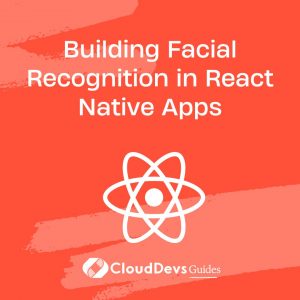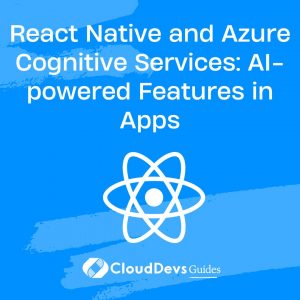Hiring Guide for React Native Developers: Find Your Fit
React Native is a well-known open-source framework that allows developers to create mobile applications using JavaScript. Designed by Facebook, React Native has gained significant traction among developers due to its efficiency and versatility. It has become a go-to choice for developers looking to quickly develop robust mobile applications for both Android and iOS. React Native provides a vast library of tools and components that facilitate the building of high-quality applications in an efficient manner. It is also easy to learn, making it suitable for developers with diverse skill levels. Additionally, React Native is consistently developed and updated to ensure developers have access to the latest technology. The central concept behind React Native is the use of reusable components, which are pre-built UI elements used for creating the user interface of applications. By reusing these components, developers can ensure consistency across different platforms and screens while saving time.
Table of Contents
1. The Need to Hire React Native Developers for Your Company
The market for mobile phones has experienced unprecedented growth in the past decade, transforming mobile phones from simple communication devices into tools integrated into everyday life.
With rapid technological developments, mobile phones have become essential in our daily routines, enabling communication, global connectivity, and real-time access to information. The surge in demand for mobile phones has led to an increased need for user-friendly and innovative mobile applications. This exponential growth in the mobile application market has resulted in a rise in demand for skilled developers, particularly React Native developers.
The surge in demand for skilled React Native developers is driven by the increasing number of organizations recognizing the potential of mobile applications as a platform for engaging with their customers, driving revenue, and enhancing user experience. As the dynamic market for mobile applications continues to expand, the demand for skilled React Native developers will only increase, presenting lucrative opportunities for organizations to hire React Native developers and capitalize on the benefits they bring to the business.
2. Benefits that React Native and React Native Developers Bring to Your Company
2.1 Deploying Code Across Multiple Platforms:
A significant advantage of React Native is its capability to enable developers to write code once and deploy it across multiple platforms, including Android and iOS. This cross-platform compatibility reduces development effort and time, making React Native developers an attractive choice when building mobile apps for various devices.
2.2 Quick Development Process:
React Native’s “hot reloading” capability allows developers to observe changes in real-time without reloading the entire application. This feature facilitates quick iterations and bug fixes, significantly speeding up the development process.
2.3 Native Performance:
By leveraging the device’s native APIs and rendering capabilities, React Native enables the development of responsive and fast applications, providing a smooth user experience.
2.4 Ecosystem of Third-Party Libraries and Tools:
React Native offers a vast array of APIs and third-party libraries that enhance its capabilities. These libraries provide additional functionalities that can easily be integrated into React Native projects.
3. Responsibilities of React Native Developers
3.1 Developing Mobile Apps with React Native Framework:
React Native developers use the framework to develop and deploy user-friendly mobile applications. They collaborate with other teams to design, develop, and deliver features. They write clean, maintainable, and efficient code while implementing best practices and coding standards. Collaboration with cross-functional teams ensures that developed applications are optimized for mobile devices, providing users with a great experience.
3.2 Troubleshooting and Debugging Issues:
React Native developers optimize applications for maximum speed and scalability. Troubleshooting and debugging help identify the root cause of issues and fix them promptly. Optimizing applications helps them run faster, more efficiently, and scale better as demand increases.
3.3 Working Closely with UI/UX Designers:
React Native developers collaborate with UI/UX designers to ensure the correct implementation of code and consistent design throughout the development process. Code reviews are conducted to catch bugs early and ensure code quality and performance. Integrating APIs and other services: React Native developers write comprehensive unit tests to ensure code coverage and reliability. They work with backend developers to ensure correct data collection and organization for the frontend. Unit tests help identify and fix bugs that may occur in the future.
4. Key Skills to Look for When Hiring React Native Developers
4.1 Technical Skills:
4.1.1 Proficiency in JavaScript:
React Native heavily relies on JavaScript for creating mobile applications. Therefore, assessing a developer’s proficiency in JavaScript is imperative. They should have a deep understanding of core JavaScript concepts, including variables, functions, arrays, objects, and control flow. Knowledge of modern JavaScript features and libraries, such as ES6 and TypeScript, is highly beneficial.
4.1.2 Strong Knowledge of React:
React Native is built on top of React, a JavaScript library for building user interfaces. A competent React Native developer should have a strong understanding of React’s fundamentals, including component-based architecture, virtual DOM, JSX syntax, state management, and props. Familiarity with React hooks and context API is also desirable.
4.1.3 Experience with Native Development:
While React Native allows for cross-platform development, there are instances where developers need to write platform-specific code. Therefore, evaluating a candidate’s experience with native development for both iOS and Android platforms is essential. Proficiency in platform-specific languages like Swift/Objective-C for iOS and Java/Kotlin for Android is advantageous.
4.1.4 Knowledge of React Native APIs and Libraries:
React Native provides a wide range of APIs and third-party libraries to extend its functionality. A skilled React Native developer should be familiar with core React Native APIs, including navigation, animations, and networking. Additionally, experience with popular libraries like Redux, Axios, React Navigation, and Firebase can greatly enhance the development process.
4.1.5 Understanding of Mobile App Architecture:
Developing scalable and maintainable mobile applications requires a solid understanding of mobile app architecture patterns. Look for developers familiar with concepts like MVC (Model-View-Controller), MVVM (Model-View-ViewModel), or Redux architecture. They should be able to architect and structure the codebase efficiently, ensuring code reusability and maintainability.
4.1.6 Knowledge of Mobile UI/UX Principles:
A successful React Native developer should have an eye for detail and possess knowledge of mobile UI/UX (User Interface/User Experience) principles. They should be able to create visually appealing and intuitive user interfaces, following platform-specific design guidelines. Familiarity with UI libraries like Material UI or React Native Elements is a plus.
4.2 Soft Skills:
4.2.1 Communication Skills:
React Native developers need to effectively communicate with team members, stakeholders, and clients. Strong verbal and written communication skills enable them to understand project requirements, express their ideas clearly, and provide progress updates. Good listening skills and the ability to understand and address user feedback are also essential.
4.2.2 Problem-solving Abilities:
React Native development often involves encountering complex problems and finding innovative solutions. Look for developers with strong analytical skills and a proven ability to think critically. They should be able to identify the root cause of an issue, apply logical reasoning, and devise effective solutions while maintaining a focus on user experience.
4.2.3 Adaptability:
The field of mobile app development, including React Native, is constantly evolving. It is crucial to hire developers who are adaptable and can quickly learn and implement new technologies, frameworks, and best practices. React Native developers should be eager to stay up-to-date with the latest trends and open to learning new skills.
4.2.4 Collaboration and Teamwork:
React Native developers often work in teams, collaborating with designers, backend developers, and project managers. Look for candidates who can effectively communicate and collaborate with their peers, possess strong interpersonal skills, and contribute positively to the overall team dynamic. The ability to work in a cross-functional team and adapt to different working styles is highly valuable.
4.2.5 Time Management:
Meeting project deadlines is crucial in the fast-paced world of React Native development. Look for developers who demonstrate excellent time management skills, prioritize tasks effectively, and deliver high-quality work within the given timeframe. The ability to work efficiently under pressure and handle multiple projects simultaneously is an added advantage.
4.2.6 Attention to Detail:
React Native developers need to be meticulous and pay attention to detail to ensure the quality of their code. They should possess a strong eye for detail, be thorough in testing and debugging, and exhibit a commitment to delivering error-free code. Attention to detail is crucial in maintaining the stability and user experience of developed applications.
5. How to Hire React Native Developers for Your Company
5.1 Determining Project Requirements:
Before initiating the hiring process, it is crucial to clearly define your project requirements. This includes identifying the scope of the project, outlining the desired features and functionalities of the application, and understanding the timeline and budget constraints. Having a well-defined project roadmap allows you to effectively communicate your requirements to potential candidates and assess their ability to meet your project goals.
5.2 Evaluating Technical and Soft Skills:
When evaluating React Native developers, it is important to assess their technical skills and proficiency in React Native development. Look for candidates with a strong understanding of JavaScript, React, and mobile development concepts. Assess their knowledge of common React Native libraries, such as Redux, React Navigation, and Axios, as well as their familiarity with debugging tools and performance optimization techniques. Equally important is evaluating a candidate’s soft skills. Effective communication, problem-solving abilities, and collaboration are essential traits for successful developers. During the interview process, ask open-ended questions that allow candidates to demonstrate their problem-solving skills and ability to work in a team environment.
5.3 Assessing Experience Portfolio:
A candidate’s experience portfolio provides valuable insights into their past projects and accomplishments. Look for React Native developers who have worked on projects similar to yours, as this indicates their familiarity with relevant industry standards and best practices. Review their portfolio for evidence of delivering high-quality, scalable, and user-friendly applications. Additionally, consider candidates who actively contribute to the React Native community through open-source projects or participation in relevant conferences and meetups.
5.4 Corporate Culture Fit:
The cultural fit of a candidate within your organization is crucial for a harmonious working relationship. Assess whether the candidate aligns with your company values and work culture. This can be achieved through behavioral-based interview questions that gauge their compatibility with your team dynamics. Evaluating their passion for learning, adaptability, and willingness to collaborate can help determine if they will thrive in your work environment.
6. Cost of Hiring React Native Developers
The average pay for React Native developers is around $60 per hour. However, hourly rates for hiring React Native developers can range from $20 to $90, depending on several factors.
6.1 Experience:
Senior React Native developers with higher levels of expertise and experience are likely to charge higher rates compared to their junior counterparts. While hiring senior React Native developers may cost over $70 per hour, junior React Native developers may charge around $17 per hour.
6.2 Project Complexity:
The cost of hiring React Native developers can vary based on the complexity of the project. More complex projects, involving intricate features or backend system integration, may require more experienced React Native developers who charge higher rates.
6.3 Location:
Geographic location is another primary factor influencing the cost of hiring React Native developers. React Native developers from North America, Australia, and Europe may have higher hourly charges compared to developers from Africa or Asia. Additionally, hiring dedicated React Native developers may incur higher costs than hiring remote React Native developers due to overhead expenses.
By considering these factors, you can estimate the cost of hiring React Native developers based on your specific requirements and budget.
Table of Contents








